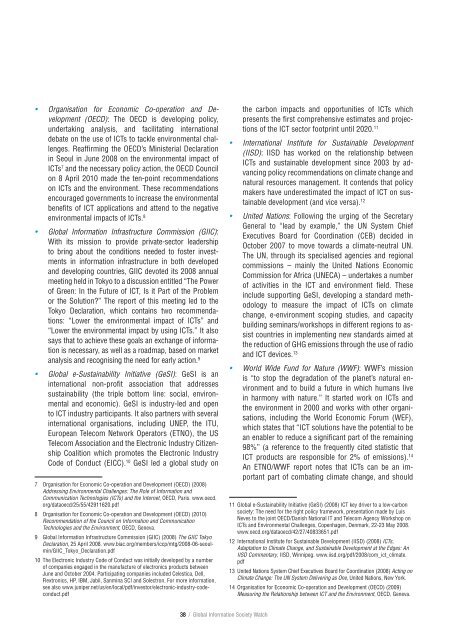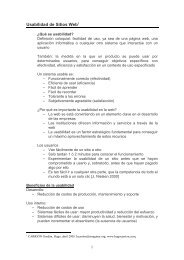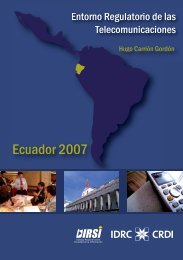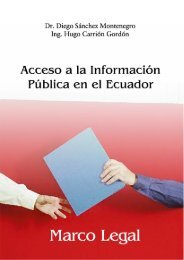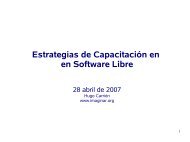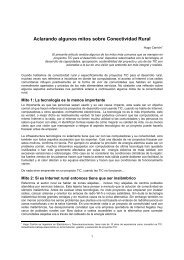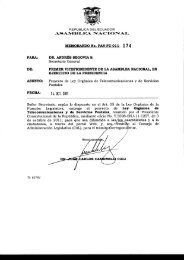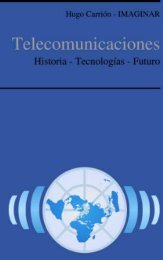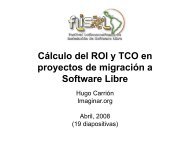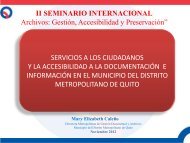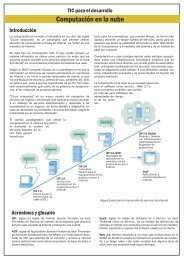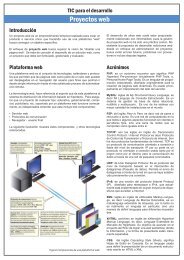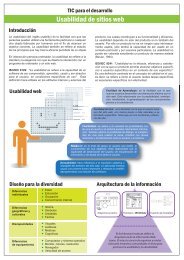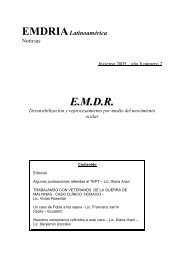GLOBAL INFORMATION SOCIETY WATCH 2010
GLOBAL INFORMATION SOCIETY WATCH 2010
GLOBAL INFORMATION SOCIETY WATCH 2010
Create successful ePaper yourself
Turn your PDF publications into a flip-book with our unique Google optimized e-Paper software.
• Organisation for Economic Co-operation and Development<br />
(OECD): The OECD is developing policy,<br />
undertaking analysis, and facilitating international<br />
debate on the use of ICTs to tackle environmental challenges.<br />
Reaffirming the OECD’s Ministerial Declaration<br />
in Seoul in June 2008 on the environmental impact of<br />
ICTs 7 and the necessary policy action, the OECD Council<br />
on 8 April <strong>2010</strong> made the ten-point recommendations<br />
on ICTs and the environment. These recommendations<br />
encouraged governments to increase the environmental<br />
benefits of ICT applications and attend to the negative<br />
environmental impacts of ICTs. 8<br />
• Global Information Infrastructure Commission (GIIC):<br />
With its mission to provide private-sector leadership<br />
to bring about the conditions needed to foster investments<br />
in information infrastructure in both developed<br />
and developing countries, GIIC devoted its 2008 annual<br />
meeting held in Tokyo to a discussion entitled “The Power<br />
of Green: In the Future of ICT, Is it Part of the Problem<br />
or the Solution?” The report of this meeting led to the<br />
Tokyo Declaration, which contains two recommendations:<br />
“Lower the environmental impact of ICTs” and<br />
“Lower the environmental impact by using ICTs.” It also<br />
says that to achieve these goals an exchange of information<br />
is necessary, as well as a roadmap, based on market<br />
analysis and recognising the need for early action. 9<br />
• Global e-Sustainability Initiative (GeSI): GeSI is an<br />
international non-profit association that addresses<br />
sustainability (the triple bottom line: social, environmental<br />
and economic). GeSI is industry-led and open<br />
to ICT industry participants. It also partners with several<br />
international organisations, including UNEP, the ITU,<br />
European Telecom Network Operators (ETNO), the US<br />
Telecom Association and the Electronic Industry Citizenship<br />
Coalition which promotes the Electronic Industry<br />
Code of Conduct (EICC). 10 GeSI led a global study on<br />
7 Organisation for Economic Co-operation and Development (OECD) (2008)<br />
Addressing Environmental Challenges: The Role of Information and<br />
Communication Technologies (ICTs) and the Internet, OECD, Paris. www.oecd.<br />
org/dataoecd/25/55/42911620.pdf<br />
8 Organisation for Economic Co-operation and Development (OECD) (<strong>2010</strong>)<br />
Recommendation of the Council on Information and Communication<br />
Technologies and the Environment, OECD, Geneva.<br />
9 Global Information Infrastructure Commission (GIIC) (2008) The GIIC Tokyo<br />
Declaration, 25 April 2008. www.biac.org/members/iccp/mtg/2008-06-seoulmin/GIIC_Tokyo_Declaration.pdf<br />
10 The Electronic Industry Code of Conduct was initially developed by a number<br />
of companies engaged in the manufacture of electronics products between<br />
June and October 2004. Participating companies included Celestica, Dell,<br />
Flextronics, HP, IBM, Jabil, Sanmina SCI and Solectron. For more information,<br />
see also www.juniper.net/us/en/local/pdf/investor/electronic-industry-codeconduct.pdf<br />
the carbon impacts and opportunities of ICTs which<br />
presents the first comprehensive estimates and projections<br />
of the ICT sector footprint until 2020. 11<br />
• International Institute for Sustainable Development<br />
(IISD): IISD has worked on the relationship between<br />
ICTs and sustainable development since 2003 by advancing<br />
policy recommendations on climate change and<br />
natural resources management. It contends that policy<br />
makers have underestimated the impact of ICT on sustainable<br />
development (and vice versa). 12<br />
• United Nations: Following the urging of the Secretary<br />
General to “lead by example,” the UN System Chief<br />
Executives Board for Coordination (CEB) decided in<br />
October 2007 to move towards a climate-neutral UN.<br />
The UN, through its specialised agencies and regional<br />
commissions – mainly the United Nations Economic<br />
Commission for Africa (UNECA) – undertakes a number<br />
of activities in the ICT and environment field. These<br />
include supporting GeSI, developing a standard methodology<br />
to measure the impact of ICTs on climate<br />
change, e‐environment scoping studies, and capacity<br />
building seminars/workshops in different regions to assist<br />
countries in implementing new standards aimed at<br />
the reduction of GHG emissions through the use of radio<br />
and ICT devices. 13<br />
• World Wide Fund for Nature (WWF): WWF’s mission<br />
is “to stop the degradation of the planet’s natural environment<br />
and to build a future in which humans live<br />
in harmony with nature.” It started work on ICTs and<br />
the environment in 2000 and works with other organisations,<br />
including the World Economic Forum (WEF),<br />
which states that “ICT solutions have the potential to be<br />
an enabler to reduce a significant part of the remaining<br />
98%” (a reference to the frequently cited statistic that<br />
ICT products are responsible for 2% of emissions). 14<br />
An ETNO/WWF report notes that ICTs can be an important<br />
part of combating climate change, and should<br />
11 Global e-Sustainability Initiative (GeSI) (2008) ICT key driver to a low-carbon<br />
society: The need for the right policy framework, presentation made by Luis<br />
Neves to the joint OECD/Danish National IT and Telecom Agency Workshop on<br />
ICTs and Environmental Challenges, Copenhagen, Denmark, 22-23 May 2008.<br />
www.oecd.org/dataoecd/42/27/40833651.pdf<br />
12 International Institute for Sustainable Development (IISD) (2008) ICTs,<br />
Adaptation to Climate Change, and Sustainable Development at the Edges: An<br />
IISD Commentary, IISD, Winnipeg. www.iisd.org/pdf/2008/com_ict_climate.<br />
pdf<br />
13 United Nations System Chief Executives Board for Coordination (2008) Acting on<br />
Climate Change: The UN System Delivering as One, United Nations, New York.<br />
14 Organisation for Economic Co-operation and Development (OECD) (2009)<br />
Measuring the Relationship between ICT and the Environment, OECD, Geneva.<br />
38 / Global Information Society Watch


